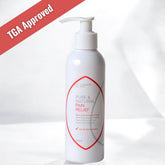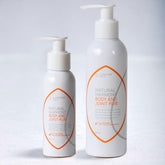Does Deodorant Stop Sweating?

No, deodorant does not stop sweating; it works to neutralise the odour caused by sweat. Products that actually reduce sweating are called antiperspirants that temporarily block sweat ducts.
In this article we’ll explore what deodorant does, what antiperspirant does, and how to choose the right product for your needs, especially in the climate where hot weather, humidity and active lifestyles call for smart under‑arm care.
1. What exactly is Deodorant?
Deodorant is a cosmetic product designed to control or mask body odour. It includes ingredients that:
- reduce the growth of bacteria on skin surface (odour‑causing microbes)
- provide fragrance or an odour‐masking effect
- may include moisture‐absorbing agents, but it does not block sweat ducts or stop sweat production
Key points:
- Deodorants don’t contain the aluminium salts that antiperspirants use.
- In hot, humid environments, deodorant may leave you smelling fresher, but won’t stop visible sweating or wet patches.
- If your main issue is odour, deodorant may be sufficient. If your main issue is sweating, then look for antiperspirants.
2. What Is an Antiperspirant?
Antiperspirant is the term used for those products which include active ingredients that temporarily reduce or block sweat from reaching the skin’s surface, especially in areas like the under‑arms.
How they work:
- The primary active ingredients are aluminium salts (for example aluminium chlorohydrate) which interact with sweat and the skin’s sweat ducts.
- These aluminium compounds form a gel‑like plug inside sweat ducts, reducing the amount of sweat that reaches the surface of the skin.
- Dermatologists commonly recommend them as the first step for managing heavier under‑arm sweating.
In short: If you’re dealing with sweating (moisture, wet patches, visible sweat under shirts), an antiperspirant is the scientifically appropriate choice, not just a deodorant.
3. Why Deodorant Doesn’t Stop Sweating
It’s a common mistake: seeing “deodorant” and assuming it means “no sweat”. Here’s why that isn’t accurate:
- Deodorants do not plug sweat ducts. They address odour, not the mechanism of sweat production.
- Sweat is a natural bodily function associated with temperature control, physical exertion, stress, environment. Deodorant isn’t designed to interfere with that.
- Many consumer searches and product labels blur the line between deodorant and antiperspirant, but scientifically and legally the two are distinct.
- So, if the question is “Does deodorant stop sweating?”, the answer is no, it doesn’t stop the sweat. It helps with odour.
4. How to Choose the Right Product for You
To pick the right under‑arm product for your needs, consider these factors:
A. Identify your main concern
- Odour only → You may be fine with a deodorant.
- Sweat and moisture (wetness, visible dampness, underarm patches, shirts sticking) → Look for antiperspirant.
- Both odour + sweating → Choose a product that clearly states “antiperspirant + deodorant”.
B. Know the product label
- For antiperspirants: look for aluminium‑based active ingredients (e.g., aluminium chlorohydrate, aluminium zirconium) and claims like “reduces sweat” or “controls wetness”.
- For deodorants: label may say “odour control”, “fragrance-free”, “bacteria‑fighting”, and will typically not claim to stop sweat.
C. Application tips to maximise benefit
- For antiperspirants: applying at night to dry, clean skin often gives better results, sweat ducts are less active, the plug formation works better.
- Under heavy sweat conditions (gym, outdoor labour) consider multiple application zones or frequent re‑application as per product instructions.
- For deodorants: ensure under‑arm area is dry, clean (less moisture = less bacterial growth = better odour control).
D. Skin and clothing considerations
- Some antiperspirant products may leave residue or yellow marks on clothing (especially white shirts).
- For sensitive skin, fragrance‑free or low‑fragrance deodorants may reduce irritation.
- If you sweat heavily (hyperhidrosis), consider higher‑strength formulations or consult a specialist.
Read more: How to Get Deodorant Stains Completely Out of Clothes
5. Putting It into Practice
Given the climate and lifestyle (hot summers, humid conditions, outdoor activity), here’s a simple routine:
- Night before: Clean under‑arms thoroughly, apply antiperspirant if sweat is your issue.
- Morning: If you’ve used antiperspirant, or if odour is the main issue, apply a deodorant (or a combined product) after showering and drying under‑arms.
- During the day: For extra‑hot days or during heavy physical activity, carry a travel size deodorant or use wipes to stay fresh.
- Clothing choice: Opt for breathable fabrics (cotton, merino) and switch your under‑arm product seasonally (lighter fragrance in summer, heavier protection in humid months).
- Monitor results: If you find visible sweat is still a persistent issue, you may want to switch to a more robust antiperspirant or seek advice from a dermatologist.
FAQs
Does deodorant expire?
Yes, most deodorants and antiperspirants have a “best before” or recommended use‑by period. Their active ingredients and fragrance may lose potency over time, so they may become less effective.
Learn more: Does Deodorant Expire? Here’s What You Need to Know
Does deodorant cause body odour?
Not directly. Deodorant is designed to reduce or mask odour by targeting bacteria or adding fragrance. If odour worsens, it might be due to sweat accumulation, product build‑up or bacterial overgrowth, you may want to clean, switch product type or apply more regularly.
Does deodorant spray stain clothes?
It may. Some sprays (or antiperspirants) contain aluminium salts or other compounds that, when mixed with sweat, can create yellowish or stiff patches on fabric especially white shirts. Choosing clear‑dry formulas or letting the product dry before dressing can help reduce staining.
Does deodorant kill bacteria?
Many deodorants are formulated to help control the bacteria that break down sweat into odorous compounds. Yes, they may contain antimicrobial agents or ingredients to reduce bacteria growth. But this does not mean they block sweat glands, so they still don’t prevent sweating itself.
Key Takeaways
- If your concern is sweating‑volume or visible wetness, you’ll want an antiperspirant (with aluminium salts) rather than a deodorant.
- If your concern is body odour, a deodorant may suffice or choose a dual‑function product labelled “antiperspirant + deodorant”.
- Whether you opt for deodorant or antiperspirant, proper application, skin preparation and fabric choice matter especially in the hot climate.
- Deodorant does not stop sweating; it supports odour control. Saying “I’ll only wear a deodorant so I don’t sweat” isn’t accurate.
- If you experience excessive sweating (beyond what typical antiperspirants handle), consider consulting a dermatologist or healthcare professional.
- Always read the label, follow instructions, patch‑test for sensitivity, and recognise that individual responses vary.

Switch to Natural Deodorant Today
Deodorant is your go-to for odour control and freshness but it doesn’t stop sweat. If you’re struggling with wetness, opt for an antiperspirant or a hybrid formula. And for those who prefer natural, gentle, and effective odour protection, Florentine Gold Deodorant offers beautifully formulated options made for the Australian lifestyle.
Stay confident, feel fresh, and learn more about how your skin and sweat work by exploring our guides or browse our deodorant collection to find your perfect match today.
Resources
- https://www.healthline.com/health/deodorant-vs-antiperspirant
- https://www.sweathelp.org/hyperhidrosis-treatments/antiperspirants/antiperspirant-basics.html
- https://www.degreedeodorant.com/us/en/sweat-zone/what-is-antiperspirant.html
- https://int.eucerin.com/our-research/behind-the-science/anti-transpirants-and-deodorants
- https://www.medicalnewstoday.com/articles/deodorant-vs-antiperspirant
- https://health.clevelandclinic.org/antiperspirant-vs-deodorant
- https://www.washingtonpost.com/wellness/2025/02/26/deodorant-antiperspirant-sweat-body-odor/
Disclaimer: At Florentine Gold, we’re all about natural wellness and love sharing tips, stories, and insights we’ve picked up along the way. That said, everything you read in this blog is for general information and educational purposes only. It’s not medical advice and isn’t intended to diagnose, treat, cure, or prevent any condition. If you’re dealing with a health issue or taking medication, we always recommend checking in with your healthcare provider as part of your wellness journey.









